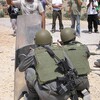
Israel’s Supreme Court has overturned a controversial Israeli law banning Palestinians from claiming compensation for harm suffered at the hands of soldiers. Citizens of “enemy states and members of terrorist organisations”, however, would not be permitted to file for compensation, according to the court’s ruling. Palestinians will also have to prove that the Israeli military operations in question did not take place as part of a clearly defined ‘war’. Hassan Jabareen, the general director of Adalah, a body championing Arab rights in Israel, said he expected more legal wrangling over what is and what is not a combat situation. “We foresee in the future another legal battle on the question of what is the scope of combat operations,” he said. Read more about Court overturns Israel's intifada law
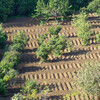
Desperate Lebanese farmers are urging their government to do more to help them recover from a war that the United Nations estimates has cost the vital agriculture industry some US $280 million and left them facing “a downward spiral of debt and poverty”. “I personally lost over 50 million Lebanese pounds [$35,000],” said Mohammed Mokahhal, a farmer from the eastern Bekaa Valley, describing his losses in the month-long summer war between Israel and militants from the Lebanese Hezbollah political party. Read more about Farmers seek government help to escape downward spiral of debt
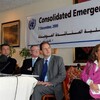
United Nations agencies and NGOs have launched a US$450 million emergency appeal for humanitarian aid for the Palestinians – the biggest-ever for the Palestinians and the third-largest in the world. So much money is needed because two-thirds of Palestinians in the West Bank and Gaza Strip have fallen into poverty, said Kevin Kennedy, the UN’s humanitarian coordinator. The international boycott on the Hamas-led Palestinian government has crippled the Palestinian economy. International donors say they will only give money directly to the Palestinian people if Hamas recognises Israel’s existence, renounces violence and abides by previous agreements between Israel and the Palestinians. Read more about $450m humanitarian appeal for Palestinians
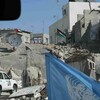
The London-based human rights organisation Amnesty International has asked the European Union (EU) to block arms sale to Israel and Palestinians so as to stave off impending disaster in Israel and the Palestinian territories. However, Israel has reacted negatively to the proposal. In an open letter to the EU on International Human Rights Day on Sunday, Amnesty’s secretary general Irene Khan said worsening human rights abuses in Israel and the Palestinian territories would lead to catastrophe. “We see a downward spiral of human rights abuses and entrenched impunity, sowing the seeds of a disaster with catastrophic consequences for ordinary people,” she wrote. Read more about Amnesty and Israel clash over arms and human rights
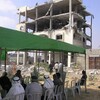
The F-16 fighters and Apache gunships may now be absent from the Gaza skies - but that doesn’t help Omar Mohammed Mamlouk and his 18-strong family, living in a tent amid the rubble of their home. The family fled their house in Gaza City’s Yarmouk Street after Mamlouk was called on his mobile by the Israeli military, an officer telling him a missile strike was to be launched on his house. “That phone call haunts me - I think about it 24 hours a day. We are now in the street. We have no shelter. I don’t know where are the human rights organisations or whether they can help us,” he told IRIN. Read more about No solutions for newly homeless
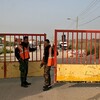
An important commercial crossing from Israel into the Gaza Strip could be re-opened next week, Israeli officials told IRIN, allowing vital food supplies into Gaza. The Karni crossing to the west of Gaza City is the only cargo terminal designed for the passage of large containers into the Strip and as such is vital for food supplies. It has been closed almost constantly since September, according to John Ging, the head of the United Nations Relief and Works Agency (UNRWA), which feeds 860,000 refugees in Gaza.”There’s no substitute for the [Karni] commercial crossing. There is no comparable alternative in terms of quantity. That is the weakness of the Gaza Strip. We are talking about hundreds of containers,” said Ging. Read more about Vital Gaza food conduit to open, Israel says
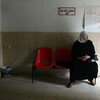
The manner in which 14-year-old Mahmoud (not his real name) caught the HIV/AIDS virus was unusual - but the subsequent reaction of Palestinian society was all too predictable. “I got it from a blood transfusion when I was 12. Now, no one talks me. My friends all left me when they knew that I’m AIDS patient. I feel I’m alone in this world. They are afraid to get infected from me, as I was infected, but it is not my fault that I have AIDS now,” said the youngster from the West Bank. “I’ll never finish college. I’ll never have a family like the others. I will never have babies. I also believe that it will not be long before I leave this world,” he added. Read more about No friends, few drugs and little expertise for AIDS patients
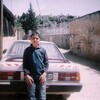
Palestinian Layth Ghalib Bedwan, 14, was arrested and detained by the Israeli authorities on 28 August 2006. Since then, his family has waited anxiously for him to return home. “His mother is crying all the time. I contacted all the children’s rights organisations in the hope that they can do something to accelerate the release of my son, but all my efforts were in vain,” said Ghalib Bedwan, 36, Layth’s father. On 9 September, an Israeli military court accused Layth of throwing stones at Israeli soldiers, sentencing him to three months in prison, and imposing a US $400 fine on him. Read more about The plight of Palestinian child prisoners
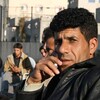
Only 20 men attended the funeral of Ma’azouz Youssef’s grandfather as the rest were not allowed to pass through Israel’s West Bank barrier to the village, Youssef said. Azzun Atma is one of the few Palestinian villages on the barrier’s eastern or Israeli side. “Only those with IDs from the village can get in. My sister could not come today because she married a man from the town of Saniri, which is on her ID as her place of residence. She cannot even visit the place where she was born,” said Youssef, 33. In Azzun Atma, Israeli soldiers lock the gates at 10pm, confining the residents until the gates are unlocked at 6am. Read more about Trapped between the lines
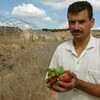
Jayyous’s farmers are used to surveying their land from their commanding hilltop village in the northern West Bank. But for many, gazing is now all they can do. Israel’s West Bank barrier has separated the village of Jayyous from 9,500 of its 13,600 dunums (a dunum is 1,000 square metres) of land, and the Israeli authorities have denied them permits to access it. “In the beginning, they gave permits to pass through gates in the barrier to 90 per cent of the people here, including children,” said Mustafa Samha, 27, a psychologist whose father has been barred from his land. “But after six months they began reducing the number of people they gave permits to.” Read more about For farmers, much of their land remains out of reach









